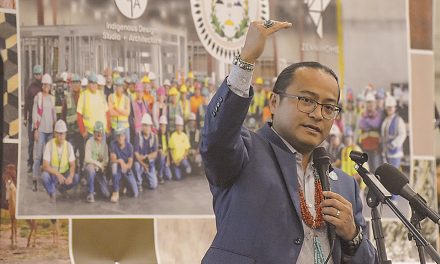
50 Years Ago: Hopi chairman at wit’s end over Navajo livestock
Hopi Tribal Chairman Clarence Hamilton is at his wit’s end about what to do to stop Navajo ranchers from allowing their sheep to wander onto Hopi Reservation land.
He’s filed complaints with the BIA and the Navajo Tribe. The problem still exists.
He has put up signs threatening to impound any sheep that wander onto the reservation. That has not helped either because BIA officials have warned Hamilton that might start a major confrontation with Navajo ranchers.
Hamilton understands what the problem really is. The Navajo lands surrounding the Hopi Reservation have been so overgrazed for decades that the sheep automatically go to where the grass is – on the Hopi Reservation.
The difference between lands on the two reservations is so profound that pilots say they can tell from the air where the Hopi Reservation starts because it is green and the Navajo lands are a dull brown.
He also knows that despite efforts by the BIA to keep Navajo ranchers from going over their grazing permit limits, almost everyone violates it so ranchers have 10 times or more than the number of animals they are allowed to graze.
It has now been more than a decade since federal courts have ruled that both tribes have equal rights to the disputed land. Despite that ruling, no land in the disputed area has been turned over to the Hopi and negotiations between the two tribes to solve the problem themselves have gone nowhere.
Just a month ago, the Hopis hired an Anglo cowboy to patrol the border area and force any Navajo sheep that happen to wander across the border back onto Navajo lands. This has helped a little but one man doesn’t have the ability to stop all the sheep that wanders onto the reservation.
The story of the hiring of the cowboy, however, has had a residual benefit because it has received a lot of attention throughout the state and it has created a lot more positive reaction for the Hopi position.
Because of this, the Hopi Tribe has done something it has never done before. It has allowed a television news crew from Phoenix to come onto the reservation with their cameras to show viewers the problems the Navajo ranchers are causing.
Up to now, no television station has been allowed to do that because of concerns by Hopi traditionists that the television cameras would violate their privacy. But times have changed and Hamilton believes that the more positive publicity the Hopis receive, the better the chances Congress will step in and pass legislation that will end the dispute in the favor of the Hopi Tribe.
MacDonald knows what the Hopi are doing and he has been trying to do the same thing by putting out short videos hosted by well-known television stars to argue the Navajo side. These videos are being sent to members of Congress in the hopes they will view them.
Activist raises concern over taxes
Hamilton isn’t the only person frustrated with the way MacDonald is running the tribe. John Redhorse, a Navajo activist living in Farmington, has taken MacDonald to task for not carrying through with a campaign promise to start taxing major energy companies mining on the reservation.
Chet MacRorie, managing editor of the Navajo Times, has helped Redhorse get his concerns before the Navajo public by publishing his letters to the editor on a regular basis.
MacRorie has been wondering himself why MacDonald has done nothing to start the process so he allowed Redhorse to write a column on the matter.
Redhorse said the tribe is losing millions of dollars a year by not imposing a tax on companies who have taken advantage of the tribe by paying royalty rates far below what they pay off the reservation.
Redhorse’s column created a lot of buzz so after reading it, I decided to talk to Navajo officials to find out what the hang up was for taxing these companies.
George Vlassis, the tribe’s general counsel, said taxing the companies wasn’t as easy as passing a resolution and then collecting millions in revenue.
The question of whether tribes have a right to impose taxes was still up in the air because no tribe had up to that time tried to do it. He said the Navajos would probably take the lead on this issue but it would have to be done carefully or they would lose the battle in the federal courts.
He pointed out that once the legislation is passed, it would probably be in the court system for years. He had no doubt that the Navajos would win but he said it would be expensive.
There was another problem and this was a big one.
The energy companies knew that it was only a matter of time before the Navajos passed legislation to tax them so they included in lease agreements a clause preventing the tribe from imposing any taxes on them during the time the lease was in effect.
As a result, the tribe would have to renegotiate these leases or wait until they expired before they could start taxing the companies.








 Highway 264,
Highway 264, I-40, WB @ Winslow
I-40, WB @ Winslow